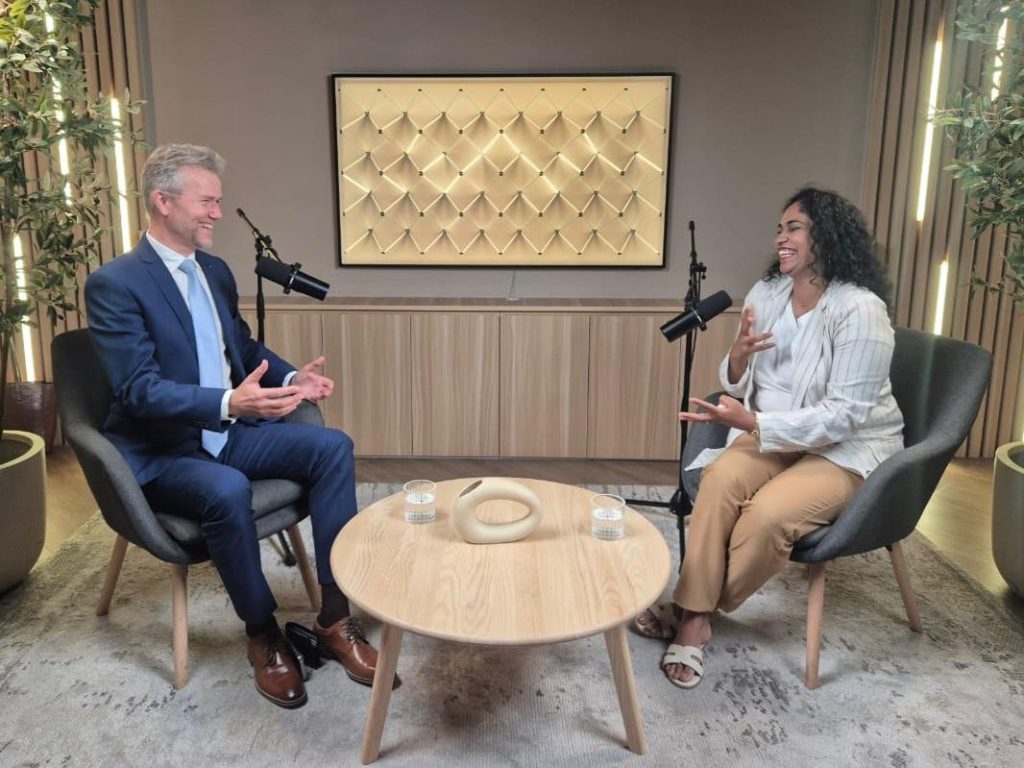Listen to the Podcast
Jotun’s Origins in the UAE: A Story of Adaptation and Resilience
In the early 1970s, Jotun, a Norwegian company specializing in marine paints, set its sights on Dubai, intending to support the emirate’s ambition to build a large dry dock facility. The plan was straightforward: provide marine coatings to ship owners looking to repair their vessels in the region. However, when the oil crisis struck in 1973-1974, everything changed. With skyrocketing oil prices and a near halt in global trade, Dubai’s plans for the shipyard were put on hold, posing a significant challenge for Jotun, which was close to completing a new factory.
Faced with this setback, Jotun took an unexpected yet strategic pivot into decorative paints, becoming the first international brand to offer paints for residential and commercial buildings in the UAE. This decision positioned Jotun to become a market leader in decorative paints across the region. Although this path was unplanned, Jotun’s agility in adapting to the local market’s needs allowed the brand to cement its reputation in the UAE, reaching both business clients and end consumers. This early entry and adaptability have become integral to Jotun’s long-term success in the Middle East.
Introducing Jotun UAE’s General Manager – Kjetil Urheim and His Journey with the Company
In a recent interview with Bilna Sandeep, Kjetil Urheim – the General Manager of Jotun UAE, who has been with the company for 24 years, shared insights into his journey. Originally from Norway, he has spent the past four years leading Jotun’s UAE operations. His career began in marketing, and over the years, his connection to Jotun deepened, culminating in his leadership role in Dubai. His extensive experience within the company has given him a unique perspective on the significance of Jotun UAE’s contributions to Jotun’s overall footprint in the region.

Reflecting on the UAE’s influence, he shared how Jotun’s early entry into the market has helped shape the company’s entire Middle Eastern presence. As other Jotun offices opened in the region, the UAE branch served as an operational model, making Dubai a vital part of Jotun’s regional success story.
Embracing the “Penguin Culture”: Jotun’s Unique Organizational Identity
One of the standout aspects of Jotun’s organizational culture is its use of “penguins” as a metaphor for its team members. Inspired by Jotun’s logo, which features a penguin, this symbolism stems from the company’s founder, who traveled on whaling expeditions from Norway to Antarctica almost a century ago. Penguins, he observed, are resilient, intelligent, and work together to endure extreme conditions—a metaphor he found fitting for his company’s values. The penguins’ ability to survive in harsh climates by taking turns at the edge of their huddle aligns with Jotun’s mission to protect and beautify.
This “penguin culture” has become a powerful symbol of teamwork and resilience within Jotun. The company encourages employees to take ownership and pride in their roles, reinforcing the importance of teamwork, loyalty, and dedication. This culture has been a cornerstone in building a workforce that not only aligns with Jotun’s mission but also contributes meaningfully to the company’s success.
Integrating Corporate Culture and Employee Empowerment at Jotun
For Jotun, employee empowerment and alignment with company values are central to its corporate culture. With core values of loyalty, boldness, care, and respect, Jotun emphasizes the importance of relationships, whether with employees, suppliers, clients, or the broader environment. As a family-owned business, Jotun prioritizes engagement, ensuring that employees’ personal goals align with the company’s overarching mission.
Kjetil believes that fostering engagement and a sense of ownership enables employees to find meaning in their work, enhancing their personal growth and well-being. This approach to employee well-being is further supported by the philosophy of “work-life harmony,” a concept Kjetil finds more relevant than “work-life balance.” Referencing Jeff Bezos, he explains that a fulfilling work life fuels happiness and positivity, which employees can then bring into their personal lives. This holistic approach is integral to Jotun’s employee engagement strategy and is a key part of its success in nurturing a motivated workforce.
Strategic Growth and Expansion Through “Organic Growth”
Jotun’s growth strategy is rooted in “organic growth,” a philosophy that sets it apart from other companies that expand through acquisitions. Instead of acquiring and integrating other companies, Jotun focuses on growing through its own employees, whom they fondly refer to as “penguins.” This approach allows Jotun to maintain a consistent corporate culture across new markets while staying true to its values.
By investing in the professional growth of its employees and encouraging them to take ownership of their roles, Jotun has established a strong presence in new markets. This strategy is both sustainable and strategic, ensuring that the company’s expansion is driven by a deep alignment with Jotun’s core principles, which continue to guide the company’s long-term vision.
Growth Through Empowerment: Jotun’s Strategy for Market Expansion
A core component of Jotun’s growth strategy is empowering its employees, or “penguins,” to take on leadership and development roles as the company expands into new markets. While Jotun typically starts by partnering with local distributors when entering new regions, it eventually deploys its own team members to establish a deeper presence. This approach enables employees to take on responsibility and challenges, fostering personal and professional growth.
Kjetil described the company’s approach as more than just business; it’s an ecosystem designed to encourage employees to grow, knowing that their development directly fuels the company’s growth. He likens Jotun to a “school,” where nurturing people ultimately nurtures the business.
Identifying Leadership Potential: Traits Over Experience
In cultivating leaders within Jotun, the company prioritizes certain character traits over sheer experience. Kjetil emphasized that, particularly as individuals progress within the company, characteristics like mindset, attitude, and a demonstrated growth-oriented approach become more valuable than years on the job. Jotun encourages its leaders to focus on team building, nurturing others’ growth, and guiding colleagues to take ownership and rise to challenges.
A key element of Jotun’s internal culture is a phrase coined by its HSE Manager in Jotun UAE: “Own the ownership.” This principle underpins Jotun’s leadership philosophy, where employees who take ownership of their roles not only succeed personally but also drive the company’s success.
A New Retail Concept: Transforming the Customer Experience
Jotun’s commitment to innovation is reflected in its recent launch of a new retail concept. As Kjetil explained, this concept was designed to revolutionize how customers experience and choose paints, moving away from the traditional model of selling paint cans to offering a full visual and experiential journey. The first store of this kind was opened in Sharjah, transforming the space into more of a “decoration studio” than a conventional paint store.
This concept allows customers, including homeowners, architects, and designers, to visualize their projects through large color samples and well-curated palettes. By showcasing colors in large formats of up to three meters, Jotun makes it possible for customers to see exactly how shades and finishes will appear over time. This retail evolution demonstrates Jotun’s dedication to enhancing customer experiences, merging aesthetic appeal with practical durability.
Global Presence and Local Production: Jotun’s Manufacturing and Distribution Model
Globally, Jotun operates in 100 countries, with 40 manufacturing plants, three of which are located in the UAE. Rather than owning retail stores, Jotun relies on distributors to sell its products worldwide. This model allows Jotun to concentrate on production and innovation while ensuring a consistent brand presence through its distribution networks.
Jotun offers a diverse range of products catering to various industries, including decorative, protective, marine, and powder coatings. The decorative line is designed for residential and commercial buildings, offering both aesthetic and protective qualities. Protective coatings, especially in a high-rise-heavy market like Dubai, provide essential fire and corrosion resistance for steel structures. Jotun’s advanced fire-retardant coatings are designed to withstand intense heat, expanding to create a thick barrier that protects steel against melting.
Dominance in the Marine Industry and Innovation in Powder Coatings
Jotun’s history began with marine coatings, a segment where it continues to be the global leader. With decades of experience, Jotun’s marine paints protect ships from corrosion caused by saltwater, a factor crucial to their longevity and operational efficiency. Kjetil highlighted that this focus, guided by the founder’s vision, remains a stronghold of the company.
The company’s newest innovation, powder coatings, brings a dry, electrostatically applied paint option that is particularly durable and commonly used on items like aluminum window frames and cladding. This technology is distinct from traditional “wet” paints, offering a long-lasting solution that serves both the architectural and industrial sectors.
Jotun’s Impact on Dubai’s Iconic Landscape
Operating in a city celebrated for its architectural marvels, Jotun has contributed significantly to many of Dubai’s iconic landmarks, including the Burj Khalifa, Dubai Mall, Burj Al Arab, and the metro system. Dubai’s high standards for aesthetics and durability create an ideal environment for Jotun to showcase its range of products, which are designed not only to protect structures but also to maintain a fresh and visually appealing look over time. Kjetil shared a statistic underscoring Jotun’s role in the global architectural scene: of the world’s 20 tallest buildings, Jotun has painted 14.
Sustainability at Jotun: Cutting Emissions and Enhancing Durability
As industries worldwide shift towards sustainability, Jotun is equally committed to reducing its environmental impact. By 2030, Jotun aims to halve its carbon emissions, with 70% of its energy consumption coming from renewable sources. This sustainability target is set against a 2017 baseline, demonstrating Jotun’s dedication to meaningful environmental progress.
In addition to energy goals, Jotun considers product durability to be a key factor in sustainability. Longer-lasting paints reduce the need for frequent reapplications, thereby lowering the overall carbon footprint of buildings. For Jotun, this focus on durability aligns with its mission to “protect property,” as it extends the life of infrastructure, saving resources and reducing waste.
Jotun’s anti-fouling paints, used in the shipping industry, are another example of sustainable innovation. By minimizing friction, these paints help ships reduce fuel consumption and thus emissions, a particularly valuable solution given that shipping remains a significant source of global carbon output. The new International Maritime Organization (IMO) regulations further incentivize fuel efficiency, and Jotun’s coatings help ship owners meet these standards.
Sustainability as a Strategic Advantage for Shipping
Jotun’s eco-friendly initiatives extend into the shipping industry, where the company’s anti-fouling paints play a critical role in reducing fuel consumption and emissions for large vessels. By creating a coating that minimizes friction with water, these paints enable ships to sail more efficiently, lowering both operational costs and environmental impact. Ship owners seeking better ratings, reduced emissions, and cost savings are increasingly adopting these solutions, especially in light of stringent new regulations from the International Maritime Organization (IMO).
Through these innovative solutions, Jotun empowers clients not only to improve sustainability but also to achieve financial efficiency, making eco-friendly choices beneficial from both an environmental and business perspective.
Leadership Through Empowerment and Responsibility
As a leader, Kjetil emphasizes the importance of empowering his team, fostering an environment where employees feel responsible for their roles and are encouraged to generate ideas. He attributes his ability to maintain creativity and resilience to his commitment to exercise, which he finds helps reduce stress and generate ideas. However, he underscores that most innovations within Jotun stem from the team’s collective input, driven by individuals who feel ownership and responsibility for their areas.
This decentralized approach allows employees to approach leadership with suggestions, fostering a culture of creativity and continuous improvement across all levels, from factory operators to upper management. Employees are encouraged to bring solutions, making them proactive contributors to Jotun’s growth and adaptability.
The Ideation Room: A Space for Innovation
To support this culture of innovation, Jotun UAE has introduced an “ideation room.” This creative space is designed to encourage employees to address challenges, share ideas, and develop solutions in a structured but inspiring environment. Equipped with resources like strategic walls and targets, the ideation room allows teams to work collaboratively on real-world solutions, promoting Jotun’s values of care, boldness, and ownership in a tangible way.
The ideation room is a relatively recent addition, established just a year or two ago, but it represents Jotun’s commitment to harnessing the expertise and creativity of its workforce. This space embodies the company’s belief that decisions and solutions are best generated closest to the point of action, where team members directly interact with markets, products, and customers.
Shifting from Delegation to Responsibility
Rather than simply delegating tasks, Jotun’s leadership philosophy involves helping team members understand and accept responsibility for their roles. Kjetil described this approach as creating a sense of “you should, you will, you can,” which encourages employees to take ownership of their responsibilities rather than waiting for instructions. This strategy empowers individuals to feel truly invested in their work and confident in their decision-making, ultimately fostering a team that is passionate, motivated, and eager to contribute to Jotun’s ongoing success.
Reflecting on Leadership Challenges
In reflecting on the challenges of leadership, Kjetil expressed gratitude for his team at Jotun UAE, highlighting their commitment, enthusiasm, and the lengths to which they go to take charge of and excel in their roles. This deep sense of ownership, combined with a shared passion for the company’s mission, is central to the team’s strength. While he admitted that identifying specific challenges was difficult due to the team’s dedication, he attributes much of Jotun’s success to the collective energy and commitment of its people.
Staying Engaged with Talent Through LinkedIn
As a leader, maintaining a visible and authentic presence on LinkedIn has proven valuable for Kjetil. Not only does it foster closer connections with employees, who see him as the same person online as in the office, but it also showcases Jotun’s culture and values to potential hires. This personal touch and transparency set a strong example for those aspiring to join Jotun, presenting it as a company that values engagement and openness.
Kjetil is also dedicated to responding personally to those reaching out for job opportunities, recognizing the effort they put into contacting him. He provides guidance on available positions and directs them to the right contacts, ensuring that each applicant feels respected and valued.
Providing Direction for Future Leaders
In closing, Kjetil offered valuable advice for future leaders in the construction industry. He encouraged aspiring leaders to fully embrace ownership of their roles and to find energy and pride in what they do. He explained that once someone experiences this alignment of energy and purpose, it becomes a source of constant motivation and resilience. However, he acknowledged that achieving this sense of ownership and passion can be challenging, and each person must find their path to it.
Wrapping Up with Words of Appreciation
The episode concluded with expressions of gratitude, with Bilna thanking the Kjetil for sharing his insights and stories. The host invited viewers to explore more about Jotun and follow the Kjetil on LinkedIn to stay connected with his journey. She also encouraged the audience to engage by liking, subscribing, and commenting with their suggestions for future guests.
The conversation closed with a note of appreciation from the Kjetil, who described the experience as a “super nice conversation,” underlining the importance of open dialogue and connection in his leadership style.


